

Where Will Growth Come From in 2015? Fashion CEOs Speak. (Clockwise from top left) Rodrigo Bazan, Fabrizio Cardinali, Wen Zhou and Adrian Joffe | Source: Courtesy LONDON, United Kingdom — 2014 was a year of geo-political tumult.
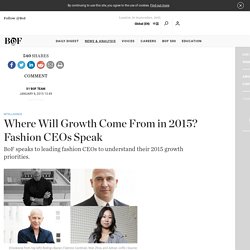
The crisis in the Ukraine. Hostilities in Syria and Iraq. The Ebola outbreak. Pro-democracy protests in Hong Kong. 2015 is set to be a challenging year for the luxury sector, as well. Meanwhile, in India, the election of pro-business prime minister Narendra Modi has sparked a wave of new optimism, but the country has yet to emerge fully as a lucrative luxury goods market. There are two bright spots on an otherwise gloomy landscape, however. BoF spoke to five fashion CEOs to understand their top growth priorities for the new year.
Rodrigo Bazan of Alexander Wang: “We continue to have strong double-digit growth in the US, Europe and Asia. “Since 2014 e-commerce is our biggest retail platform worldwide. “Overall we continue to see very balanced, strong growth in both our apparel and accessories businesses. John D. FashionFutures_2025_FINAL_SML. Economy Of Fashion: How Different Trends Reflect The Financial State. It's common knowledge fashion is cyclical in nature.
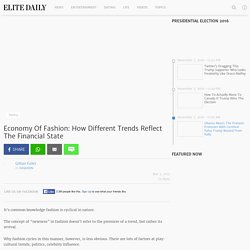
The concept of “newness” in fashion doesn't refer to the premiere of a trend, but rather its revival. Why fashion cycles in this manner, however, is less obvious. There are lots of factors at play: cultural trends, politics, celebrity influence. One one of the most surprising factors to influence the cycle of fashion, though, is the state of the global economy. If you think about it, it makes sense. During tougher times, if you need new clothes, the focus is less on passing fads and more on classic, quality pieces worth the expenditure because they’ll last (which also aids in cutting down cost per wear). As FIT professor John Mincarelli tells ABC News, “In rough economic times, people shop for replacement clothes,” adding “basics” prevail during an economic downturn. Economist George Taylor was the first to notice the correlation between fashion and the economy; he developed the “Hemline Theory” to describe his findings. Pinterest How? Fashion industry.
Economic contribution. The direct value of the UK fashion industry to the UK economy is estimated at £26bn, up from £21bn in 2009, according to data from Oxford Economics, the consultancy, published by the British Fashion Council.
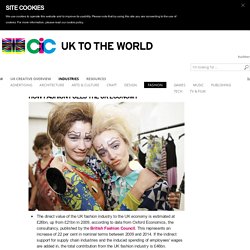
This represents an increase of 22 per cent in nominal terms between 2009 and 2014. If the indirect support for supply chain industries and the induced spending of employees' wages are added in, the total contribution from the UK fashion industry is £46bn.Oxford Economics estimates that fashion’s wider contribution to the UK economy in influencing spending in other industries has risen from £37bn in 2009 to over £46bn in 2014 - a 23 per cent increase.The UK fashion industry is estimated to support 797,000 jobs (down from 816,000 in 2009 which reflects an increase in productivity in the sector).
Let's Show the World that Fashion is Serious Business. LONDON, United Kingdom — When I first started writing BoF from my sofa back in 2007, one of my main motivations was to demonstrate that fashion is a serious business.
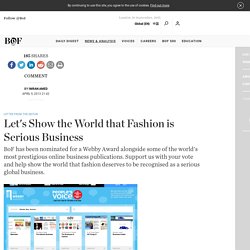
Having immersed myself in the industry in the preceding months, the magic of the fashion industry was simply fascinating to me. Where else could one find such dedicated, creative and hard-working people with a shared passion for their work? What other industry creates products that incite such passion? And which industry accepts and celebrates a cast of characters as colourful, diverse and entertaining as ours?
The short answer? Unfortunately, fashion is portrayed in much of the mainstream media as a superficial industry composed of champagne-swilling flakes who have nothing better to do than to gossip and snicker. Globally, fashion is a $1.5 trillion dollar industry. Being nominated is a huge honour for us. 1. 2. 3. We are grateful, as always, for your continued support. London Fashion Week: Fashion worth £21bn to Britain's economy. The fashion business - BBC News. Image copyright AFP We know that clothing is big business, but it may be surprising just how big.
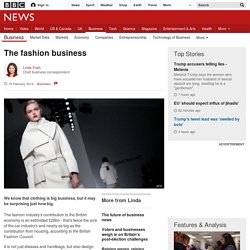
The fashion industry's contribution to the British economy is an estimated £26bn - that's twice the size of the car industry's and nearly as big as the contribution from housing, according to the British Fashion Council. It is not just dresses and handbags, but also design and manufacturing that make the sector the largest part of the so-called creative industries, which include marketing, etc. It's an important part of the services sector that makes up around four-fifths of the economy. And services has powered the economic recovery, which I have written about before.
I wrote then that it was a tougher sector to picture than say manufacturing cars which is tangible. But a couple of times a year during London Fashion Week, it is visible as models wear dresses that embody design as they sashay down the catwalk. It's also an industry that has taken to social media to reach that market. China leading world towards global economic recession, warns Citi.